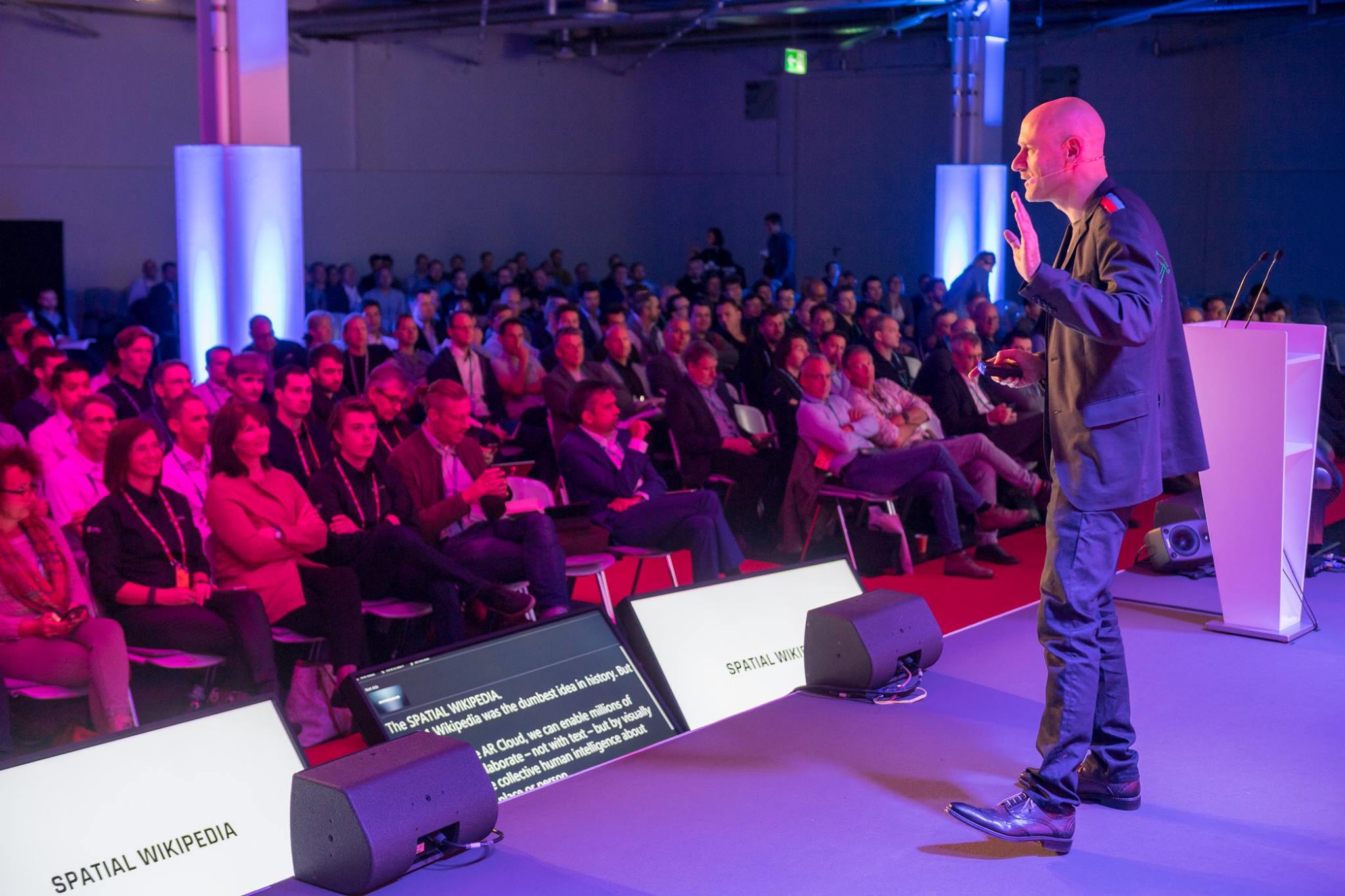The question is no longer why should I get into XR but rather HOW do I use XR
You asked hundreds of great questions to our main stage speakers at AWE EU 2018! And though we didn’t have time to address many of them during the packed program, I read all of your questions posted on sli.do and discovered that we as a community continue to share the same concerns. Below I’ve picked out some of the most telling and profound questions from the AWE EU 2018 audience, organized around the most current concerns of the XR community in Europe:
Device limitations
Many of those who attended AWE 2018 in Munich were concerned about XR device limitations such as battery life and health risks. They wanted to know from end users and XR companies alike about the device issues users are experiencing today.
What about the weight of the glasses? How long can a field tech or trainee wear a head-mounted device before experiencing discomfort? Have you determined the maximum amount of time a user can safely wear an HMD?
Have you experienced any glitches with HoloLens or other HMDs such as devices freezing, having to restart or losing orientation?
What’s the failsafe in case of the AR system not working? Should enterprise adopters completely eliminate all their paper records? Is the goal to replace the traditional [IKEA] furniture catalog or extend it?
What is the hardware milestone we’re all waiting for?
What’s the current reality of XR?
AWE EU attendees this year really wanted to know the situation on the ground for XR adoption. The speakers mentioned a lot of use cases, but which are actually a reality for investors and users?
How many of these use cases are used daily and not just demos? Which use case has the most traction? How many employees on the manufacturing shop floor are actually using this tech on a daily basis?
Have you surveyed consumers to figure out how many would actually prefer to configure and buy a car virtually instead of going to the dealership?
(Asked to investors): Do you favor B2B or B2C applications when it comes to VR?
Are any of you brave enough to invest in VR hardware today?
When will 5G be ready and will WebXR replace the Web we know?
Seeking practical advice
Attendees were hungry for user testimonials and best practices they could implement today.
Why did you choose a handheld device instead of an HMD in this use case? When should you use an HMD and when is a handheld device more appropriate? Why AR and not VR in this use case?
(Asked of both Bosch and GE): How many AR headsets/glasses did you deploy? How long did it take to roll out the solution?
What information from the AR technology are you interested in integrating into existing systems?
What are the minimum network requirements for sufficient video quality in AR?
Dealing with resistance
From management, stakeholders, IT, and workers.
Are workers more resistant to wearable devices than familiar technology like tablets? How do you overcome this?
How do you build a better partnership with IT?
In the case of remote support applications, will experienced technicians really give up going into the field to work in a call center?
How do you develop a financial plan for AR and persuade stakeholders when nothing like it has been done before at your company?
We need CONTENT
It seems content is the greatest challenge for many of us. High-quality, XR-ready content is hard to get, not to mention expensive and time-consuming to create. AWE EU attendees wanted answers.
How are companies tackling the automation of 3D content generation?
Do engineers have to turn into IT specialists and 3D artists to create AR training apps?
How much of your content creation process is automated versus manual data preparation? Are you developing this content in-house or with an external partner? Who manages ongoing content revisions?
Given that most product startups are constrained by the limited availability of XR-ready content, is a hybrid product-services business model for content the answer?
ROI – Does XR training really work?
In addition to the time it takes for XR adoption, AWE EU attendees were really interested in how much it costs to adopt XR and whether you can actually measure the tech’s success.
What’s the cost of creating a VR training session, including hardware and software? How does this compare to the cost benefits of utilizing VR over traditional training methods? Are there any demonstrable cost benefits?
Can you really get value out of remote guidance AR solutions on a mobile (smartphone) device?
How do you measure the quality and success of XR training? How do you evaluate the transfer of knowledge from the virtual to the real work environment?
How difficult is it to roll out an XR training system on a new device? Is it worth investing in XR training content on HoloLens now if I might switch to Magic Leap or another device later?
Users, apps, and diversity
The applications for XR at work are clearer than those in daily life, and the XR users of today represent a small portion of human society.
What kind of AR/VR content would attract female users? How can we create content that motivates women and other groups to use VR?
Do you see a future in which household appliances are sold as a service with AR technology? Will there be consumer AR solutions for fixing typical car troubles or performing simple tasks like fluid refills?
What about touch and smell in XR shopping? Will there be more haptic AR experiences in the future?
Are consumers interested in generating their own VR content? Would enabling consumers to create immersive content be a gamechanger for VR?
Is XR good or bad for humanity?
AWE EU attendees also got philosophical.
You’ve mentioned all the benefits of MR, but what do you think are the greatest dangers of XR for our civilization? Can the technology be misused?
What are some of the ethical considerations in capturing information about employee performance via XR devices? How do you deal with workers’ privacy concerns? Is XR really about safety or is it for observing employees?
If AR is tethered to the real world, won’t users be tracked without their consent? Won’t we have no choice but to consent? Will AR eliminate what little privacy we still have?
Do you believe the XR future will be bright (human superpowers) or dark (total surveillance)?



